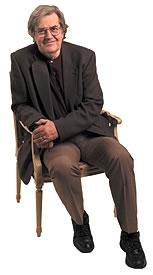Thought Control
If they can get you asking the wrong questions, they don’t have to worry about answers.
– Thomas Pynchon
Human understanding is premised upon a continuing refinement in the quality of questions we bring to any subject matter. If our distant ancestors knew little more about their physical world than the proposition that “some things fall and hurt us,” their ability to safely function in the world might have been insufficient to sustain their lives. After centuries of trying to explain such occurrences by reciting such maxims as that things fall to their natural level in the world, our ancestors became better informed by Newton’s understanding of gravity and principles of motion. His views – like the more sophisticated opinions that followed from other scientists – emerged not from the recitation of other men’s answers, but from the formulation of more complex questions.
We humans have long struggled with the abstract question of how society can be rendered more peaceful, productive, and spiritually fulfilling. Many answers have been offered by philosophers, religionists, lawyers, politicians, essayists, and other thoughtful speculators. At a time when seemingly constant wars – facilitated by ever-more advanced technologies of death; genocides; economic and emotional depressions; and other destructive dislocations preoccupy the content of what passes for “news” in our world, causal explanations are sought in simple-minded “answers” that place no burden on deeper levels of inquiry. The specters of guns, drugs, greed, hate, racism, inequality, and other hobgoblins are offered with a constancy and passion that gives a superficial appearance of sound analyses of our social problems.As I finish the writing of this article, I am informed that another mass atrocity has taken place this Bastille Day in Nice, France. The thoughtless people who expose their intellectual bankruptcies from perches of political power or the mainstream media will have nothing to offer as either a cause of or solution to the collective insanity that continues to escalate. President Obama tells us that today’s slaughter “appears to be a horrific terrorist attack.” Tremendous insight! I will be better able to sleep tonight knowing that our leader is on top of the problem! I do wonder if the one-barreled minds that see “gun control” as the solution to all social violence will now include trucks as tools to be removed from the hands of ordinary people!
 The reality of the matter seems to be that those determined to inflict massive doses of pain and death upon innocent men, women, and children, keep discovering new ways of doing so, a strategy that makes it increasingly impossible to plan for and prevent such attacks. It is also the case that those whose minds remain mired in early 20th-century thinking will have no understanding to contribute to the ending of our collective madness. Donald Trump shouted “this is war!” as the best, he could offer. At this point, I have not heard Hillary’s response, but I suspect she will be able to add two or three empty bromides. The minimal lesson to be learned from these recent events is that the outcome of this November’s presidential election will do nothing – absolutely nothing – to improve your life or liberty, or to make your world more peaceful and productive.
The reality of the matter seems to be that those determined to inflict massive doses of pain and death upon innocent men, women, and children, keep discovering new ways of doing so, a strategy that makes it increasingly impossible to plan for and prevent such attacks. It is also the case that those whose minds remain mired in early 20th-century thinking will have no understanding to contribute to the ending of our collective madness. Donald Trump shouted “this is war!” as the best, he could offer. At this point, I have not heard Hillary’s response, but I suspect she will be able to add two or three empty bromides. The minimal lesson to be learned from these recent events is that the outcome of this November’s presidential election will do nothing – absolutely nothing – to improve your life or liberty, or to make your world more peaceful and productive.
Those we have allowed to be the keeper of the questions we are allowed to ask will continue to direct our attention to such utterly meaningless inquiries as whether Hillary mishandled classified government documents, or whether Trump is too politically incorrect. For the sake of our own well-being – if not survival itself – as well as the importance of living responsible lives, we must take back the control of our minds by asking the sorts of questions we have been conditioned to not ask. As our world continues to collapse around us, we must take our thinking into unfamiliar territories.
Most of us live under the delusion that there is something that those in power can do to end our collective destructiveness. Fox News’ Greta Van Susteren expressed this quite well when, in her reports on the Nice atrocities, she asked: “why aren’t the world leaders getting together to do something about this?” The truth that thoughtful minds must discover is that political authorities are in control of nothing and that our world can be made better only by our willingness to question our tradition-bound answers, and to discover and continue to refine the quality of the questions we bring to our complex world.
The post Thought Control appeared first on LewRockwell.
Leave a Reply